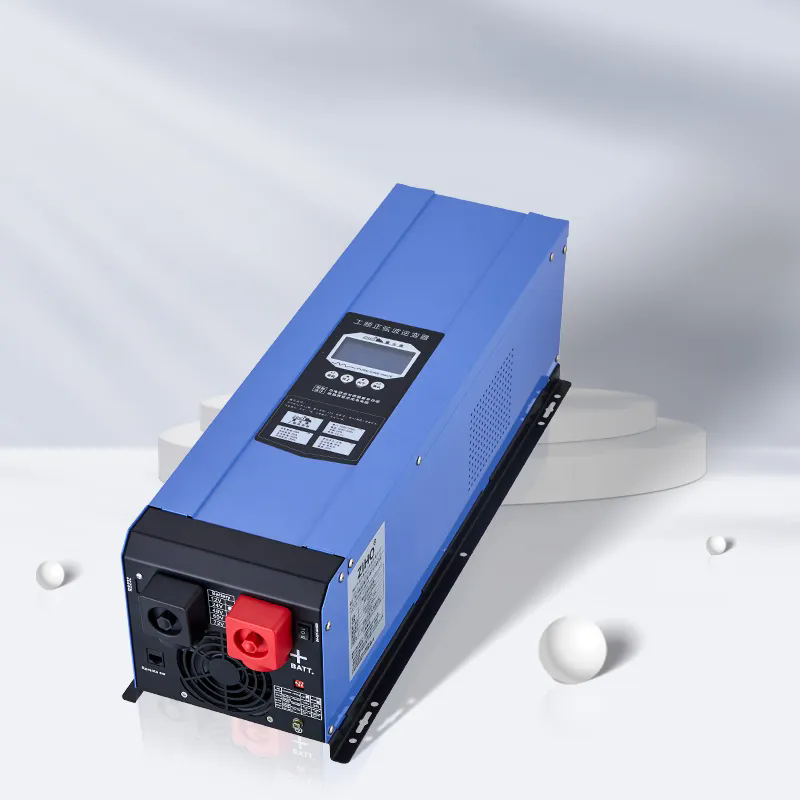Harnessing the Power of Off-Grid Inverters: A Comprehensive Guide
2024-09-12
In an age where energy independence and sustainability are becoming increasingly important, off-grid inverters are playing a crucial role in helping individuals and businesses achieve energy autonomy. These devices are essential for converting direct current (DC) from renewable energy sources into alternating current (AC) for use in various applications. In this blog, we’ll delve into what off-grid inverters are, their benefits, and how they can transform energy consumption and management.
What is an Off-Grid Inverter?
An off-grid inverter is a device that converts DC electricity, typically generated by solar panels or wind turbines, into AC electricity. Unlike grid-tied inverters, which are used in systems connected to the main power grid, off-grid inverters are designed for standalone systems that are not connected to the public electricity grid. They are essential for powering homes, cabins, remote locations, or any other application where traditional grid power is unavailable or unreliable.
Key Features of Off-Grid Inverters
1. DC to AC Conversion: The primary function of an off-grid inverter is to convert DC power from renewable energy sources (such as solar panels or batteries) into AC power, which is the standard form of electricity used by most household appliances and electronic devices.
2. Battery Integration: Off-grid inverters are often integrated with battery storage systems. This allows excess energy generated during peak production times to be stored and used later, ensuring a continuous power supply even when renewable sources are not actively generating electricity.
3. Pure Sine Wave Output: High-quality off-grid inverters produce a pure sine wave output, which is essential for the safe and efficient operation of sensitive electronic devices. Pure sine wave inverters provide clean and stable electricity, minimizing the risk of damage to appliances and electronics.
4. Advanced Features: Many modern off-grid inverters come equipped with advanced features such as programmable settings, remote monitoring, and built-in protection mechanisms. These features enhance the functionality and usability of the inverter, allowing for greater control and flexibility.
5. High Efficiency: Off-grid inverters are designed to operate efficiently, maximizing the amount of usable power generated from renewable sources. High efficiency reduces energy waste and ensures that the system provides reliable performance.
Benefits of Off-Grid Inverters
1. Energy Independence: Off-grid inverters enable users to generate and use their own electricity, reducing reliance on the public power grid. This independence is especially valuable in remote locations, during power outages, or in areas with unreliable grid infrastructure.
2. Sustainability: By using renewable energy sources such as solar or wind power, off-grid inverters contribute to a more sustainable and environmentally friendly energy system. They help reduce carbon footprints and promote the use of clean energy.
3. Cost Savings: Over time, investing in an off-grid inverter and renewable energy system can lead to significant cost savings on electricity bills. While the initial investment may be substantial, the long-term savings and potential reduction in energy costs can be substantial.
4. Flexibility and Versatility: Off-grid inverters can be used in a variety of applications, from powering remote cabins and vacation homes to supporting emergency backup power systems. Their versatility makes them suitable for a wide range of needs.
5. Reliability: Off-grid systems with high-quality inverters and battery storage provide a reliable power source, ensuring that users have access to electricity even in the absence of grid power. This reliability is crucial for maintaining essential functions and comfort.
Applications of Off-Grid Inverters
1. Remote Locations: Off-grid inverters are ideal for powering homes, cabins, and other structures located in remote areas where access to the public power grid is limited or non-existent.
2. Emergency Power: In emergency situations, off-grid inverters can provide backup power for essential appliances and devices, ensuring that users have access to electricity when the grid is down.
3. Sustainable Living: For individuals and businesses committed to sustainability, off-grid inverters offer a way to reduce dependence on fossil fuels and lower their environmental impact by using renewable energy sources.
4. Agricultural Applications: Off-grid inverters can be used to power irrigation systems, barn lights, and other agricultural equipment in areas where grid power is unavailable or impractical.
Considerations When Choosing an Off-Grid Inverter
1. Power Capacity: Determine the power requirements of your system and choose an off-grid inverter with the appropriate capacity to handle your energy needs. Consider both peak and continuous power ratings.
2. Battery Compatibility: Ensure that the inverter is compatible with your battery storage system. Some inverters are designed to work with specific types of batteries or require particular configurations.
3. Efficiency and Performance: Look for an inverter with high efficiency and reliable performance. High-quality inverters offer better energy conversion and longer-lasting durability.
4. Features and Controls: Evaluate the features and controls offered by the inverter, such as remote monitoring, programmable settings, and protection mechanisms. These features can enhance the functionality and convenience of your system.
5. Installation and Maintenance: Consider the installation requirements and maintenance needs of the inverter. Professional installation may be necessary to ensure optimal performance and safety.
Conclusion
Off-grid inverters are a vital component in the shift towards renewable energy and energy independence. By converting DC power from renewable sources into usable AC electricity, these devices enable users to harness the power of the sun, wind, and other sustainable sources. With their benefits of energy independence, sustainability, cost savings, and reliability, off-grid inverters are transforming the way we approach energy consumption and management. Whether you’re powering a remote cabin, seeking backup power, or embracing a sustainable lifestyle, off-grid inverters offer a powerful and flexible solution to meet your energy needs.



